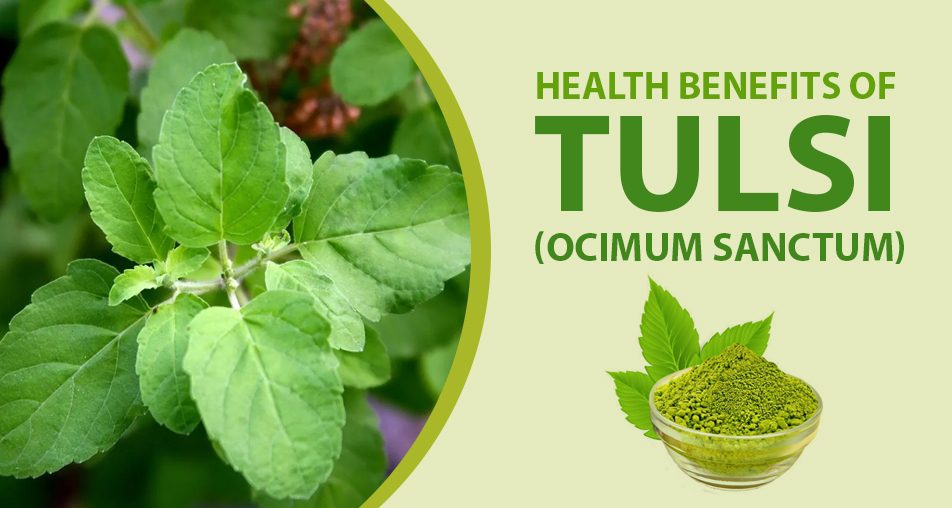Ayurvedic
Health Benefits of Tulsi (Ocimum sanctum)
Introduction, Uses & Benefits of Tulsi (Ocimum sanctum):
Tulsi (Ocimum sanctum) is considered as part of the basil family that is indigenous to India. In other words, Tulsi, known as Holy Basil, is sacred in the Hindu religion because it’s believed to be the reincarnation of the Hindu goddess Tulsi. It is considered to be a ubiquitous plant in India. Benefits of Tulsi is extensively brought to use to manage seasonal ailments like a common cold, cough, headache, stomach disorders, heart disorders, kidney disorders, and many more. The decoction prepared by mixing ginger, honey, and tulsi leaves are quite helpful in combating asthma, influenza, bronchitis, and other respiratory-related disorders.
Tulsi herb is found in the southern part of Asia like Thailand, India, etc, and has been worshipping the Tulsi herb morning and evening for the past 5000 years. Due to its wonderful medicinal uses, it is well-known in all over the world.
Habitat of Tulsi (Ocimum sanctum):
Ocimum sanctum is native to India, Iran, and now also cultivated in Egypt, France, Hungary, Italy, Morocco, and the USA. Tulsi plant is naturally found wild in the tropical and subtropical regions of the world. It is thriving in warm and temperate climates. Tulsi plant is an aromatic, low growing herb, and the leaves are bright green to purple ovate color and are grown in a warm, tropical climate.
Synonyms of Tulsi (Ocimum sanctum):
Other names of Tulsi are Manjari, Tulshi, Thulsi, Trittavu, Krishna tulsi, Gramya, Surasa, Gouri, Nagmata, etc.
Different Names of Tulsi (Ocimum sanctum):
Sanskrit Name: Tulsi, Nagmata, Krsiatulasi, Bhutaghini, Bhuteshta, Mal-tulasi
English Name: Sacred Basil, Holy Basil, Indian Basil
Telgu Name: Tulasi
French Name: Basilic
Arabic Name: Raiham
Classification of Tulsi (Ocimum sanctum):
Kingdom: Plantae
Subkingdom: Viridiplantae
Infrakingdom: Streptophyta
Division: Magnoliophyta
Sub-Division: Spermatophytina
Class: Magnoliopsida
Order: Lamiales
Super Order: Asteranae
Family: Lamiaceae
Genus: Ocimum
Species: O. tenuiflorum
Scientific Name: Ocimum sanctum
Description of Tulsi (Ocimum sanctum):
Tulsi plant is a heavy branched having all over. It attains a height of approx 80-90 cm. It has rounded oval-shaped leaves, which are 5-7 cm long. The lengths of leaves are 2-4 cm. Its seeds and are flat, yellow to reddish, and flowers are purple-creamish in color. In Tulsi plant, leaves are essential because it contains various active constituents and essential oils.
Other Species of Tulsi (Ocimum sanctum):
- Ocimum canum
- Ocimum basilicum
- Ocimum sacharicum
- Ocimum kilmand, and
- Ocimum sanctum.
Ayurvedic Properties of Tulsi (Ocimum sanctum):
Rasa (taste): Katu (pungent), Tikta (bitter)
Guna (physical property): Laghu (light), Rooksha (dry), Teekshna (piercing)
Virya (potency): Ushna (hot)
Vipaka (metabolic property): Katu (pungent)
Impact on Doshas: Balances Vata and Kapha dosha.
Classical Constituents of Tulsi (Ocimum sanctum):
Fresh leaves and stem of Tulsi (Ocimum sanctum) extract are rich in various chemicals such as cirsilineol, circimaritin, isothymusin, methylchavicol, methylcinnamat, 1, 7-dimethyl, 6-octadien, apigenin and rosameric acid, and appreciable quantities of eugeno. The leaves of Ocimum sanctum are rich in 0.7% volatile oil, comprising about 71% eugenol and 20% methyl eugenol. The oil also contains a high abundance of carvacrol and sesquiterpine hydrocarbon caryophyllene. From aqueous leaf extract of Tulsi leaves, two flavonoids are found, i.e., orientin and andviceni.
Tulsi plant is one of the best healing herbs that are rich in Vitamin A and Vitamin C that stimulates the production of disease-fighting antibodies by up to 20% and contains a high abundance of antioxidants that help to prevent cell damage that can lead to cancerous conditions.
Nutritional Information of Tulsi Leaves:
The tulsi leaves contain 5 calories of energy, 0.6g of protein, 0.3g fiber, 0.5g carbohydrates.
3.6 mg of vitamin C, 13.6 mcg of vitamin B9, 83 mcg of vitamin K, and 316. 4 mcg of vitamin A.
It is also loaded with multiple minerals, such as 11.2 mg of phosphorus, 59 mg of potassium, 35.4 mg of calcium, 0.6 mg of iron, and 11.2 mg of phosphorus.
Traditional Uses of Tulsi (Ocimum sanctum):
Tulsi is a well-known plant as “The Elixir Of Life” and the benefits of Tulsi promotes longevity and prevents a person from various infections and diseases. In Ayurveda and Siddha system, different parts of the plant are used from many years for the prevention of many illnesses and day-to-day ailments like a common cold, headache, cough, colic pain, sore throat, influenza, earache, fever, bronchitis, asthma, hepatic diseases, malarial fever, work as an antidote for snakebite and scorpion sting, migraine headaches, fatigue, skin diseases, wound, insomnia, arthritis, digestive disorders, night blindness, and diarrhea.
The benefits of Tulsi provides strength to nerves and to sharpen memory. Chewing of Tulsi leaves is effectively work in ulcers and infections of the mouth. A regular intake of Holy Basil boosts the immune system and protects from nearly all sorts of ailments from viruses, bacteria, fungi, and protozoa.
Medicinal Uses of Tulsi (Ocimum sactum):
Due to its multiple properties, the benefits of the tulsi herb are used for various purposes. Some of the best medicinal uses are given below:
Anti-stress Properties:
 Tulsi leaves contain a high amount of vitamin C and other antioxidants like camphene, which repairs free radicals damage and minimizes the stress caused by these free radicals. Benefits of Tulsi helps to calm blood pressure, reduces stress, tension, and inflammation from nerves and muscles.
Tulsi leaves contain a high amount of vitamin C and other antioxidants like camphene, which repairs free radicals damage and minimizes the stress caused by these free radicals. Benefits of Tulsi helps to calm blood pressure, reduces stress, tension, and inflammation from nerves and muscles.
Respiratory Disorders:
 Tulsi leaves are rich in camphene, eugenol, and cineole that help manage cough and cold, asthma, influenza, bronchitis, and other respiratory disorders. Tulsi acts as an immune modulator, antitussive, anti-inflammatory, and expectorant that helps in multiple ways to get rid of respiratory-related conditions.
Tulsi leaves are rich in camphene, eugenol, and cineole that help manage cough and cold, asthma, influenza, bronchitis, and other respiratory disorders. Tulsi acts as an immune modulator, antitussive, anti-inflammatory, and expectorant that helps in multiple ways to get rid of respiratory-related conditions.
Eye Diseases:
 Tulsi leaves juice along with Triphala is used from ancient times as an Ayurvedic eye drops mainly recommended for conjunctivitis, glaucoma, and other painful and severe eye diseases. In daily routine, the use of tulsi oil along with honey, is supposed to improve eyesight.
Tulsi leaves juice along with Triphala is used from ancient times as an Ayurvedic eye drops mainly recommended for conjunctivitis, glaucoma, and other painful and severe eye diseases. In daily routine, the use of tulsi oil along with honey, is supposed to improve eyesight.
Boosts Cardiovascular Health:
 Basil is best known to help people with hypertension and other cardiac disorders because it effectively prevents the formation of clots in the arteries, lowers the risk of various heart diseases, and improves the cardiac functioning system.
Basil is best known to help people with hypertension and other cardiac disorders because it effectively prevents the formation of clots in the arteries, lowers the risk of various heart diseases, and improves the cardiac functioning system.
Lowers Cortisol Levels:
 Tulsi leaves are loaded with antioxidants, and adaptogen properties help in lowering the blood pressure and cholesterol by regulating cortisol levels, reducing the risk of stroke, heart attack, and other related diseases.
Tulsi leaves are loaded with antioxidants, and adaptogen properties help in lowering the blood pressure and cholesterol by regulating cortisol levels, reducing the risk of stroke, heart attack, and other related diseases.
Soothes Indigestion:
 The benefits of tulsi improves digestion, soothes the stomach, and relieves indigestion issues. It is one of the best and safe Ayurvedic herb that helps in stimulating the stomach to produce more mucus. The nutrients present in tulsi leaves feed the good bacteria in the gut and provide relief from cramps, flatulence, constipation, and other digestion-related issues.
The benefits of tulsi improves digestion, soothes the stomach, and relieves indigestion issues. It is one of the best and safe Ayurvedic herb that helps in stimulating the stomach to produce more mucus. The nutrients present in tulsi leaves feed the good bacteria in the gut and provide relief from cramps, flatulence, constipation, and other digestion-related issues.
Improves Liver Function:
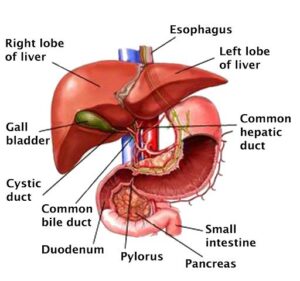 Basil leaves act as the best hepatoprotective. They stimulate the production of Cytochrome P450 enzyme, which helps with detoxification and removing metabolic and other toxic chemicals from the liver organ and stimulates the functioning.
Basil leaves act as the best hepatoprotective. They stimulate the production of Cytochrome P450 enzyme, which helps with detoxification and removing metabolic and other toxic chemicals from the liver organ and stimulates the functioning.
Prevents Hair Loss:
 Tulsi leaves are loaded with multiple nutrients that nourish the scalp, supplies proper required nutrients to the hair follicles, eliminating itching, boost blood circulation to the scalp, stimulating hair growth, leads to healthy and shiny hair, eliminates dandruff, and provides multiple health benefits.
Tulsi leaves are loaded with multiple nutrients that nourish the scalp, supplies proper required nutrients to the hair follicles, eliminating itching, boost blood circulation to the scalp, stimulating hair growth, leads to healthy and shiny hair, eliminates dandruff, and provides multiple health benefits.
Boosts Immunity:
Holy Basil acts as a natural immunity booster and keeps infections at bay. It protects against nearly all infections from bacteria, viruses, protozoa, fungi, etc. Regular intake of Tulsi leaves extract increases the T helper cells and natural killer cells activity, boosting the immune system, improve blood circulation, and prevents a person from seasonal ailments.
Anti-Inflammatory:
Due to its anti-inflammatory properties and compound known as eucalyptol, it works amazingly in relieving pain, inflammation, tenderness, stiffness, redness. It improves blood circulation, stimulates the production of fluids in the joints, and lubricates them making it a natural analgesic.
Anti-Aging:
Holy basil is loaded with anti-oxidant, which carries anti-microbial, anti-bacterial, anti-fungal, anti-aging properties help to keep acne, blemishes, breakouts at bay and keep your skin healthy, beautiful, and glowing.
Quantity Which We Can Use in a Different Form to Get Benefits of Tulsi:
Tulsi seeds powder: 3-6 grams
Tulsi root decoction: 50-100 ml
Tulsi fresh juice: 10-20 ml
Classical Formulation of Tulsi (Ocimum sanctum):
Tribhuvankirti Rasa,
Manasamitra Vakatam,
Mukta Panchamrit Rasa.
Tulsi Capsule from Deep Ayurveda’s Company:
Deep Ayurveda Company is one of the best manufacturing units verified by multiple certificates. It runs from the last 13-14 years by the team of an Experienced and Qualified Ayurvedic Doctor. The doctor itself prepares the formulation of each product by following the Ayurvedic guidelines. All the products are 100% pure, genuine, authenticated, safe, only extract-based, result-oriented and are free from chemical, preservatives, or any adulterations.
Brief descriptions of products are given below:-
Tulsi Capsule: Tulsi capsule is a 100% extract of Tulsi herb (Ocimum sanctum) and is rich in multiple nutrients, vitamins, chemical composition, etc. Benefits of Tulsi effectively promotes respiratory health, boosts the immune system, increases stamina, promotes heart and kidney health, improves skin texture, helps in combating stress, anxiety, depression, and other mental ailments.
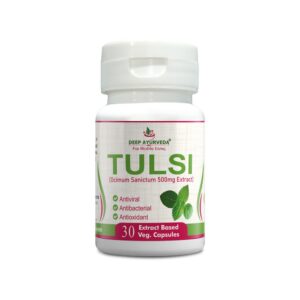 A regular intake of the Tulsi capsule improves immunity and keeps a person away from seasonal ailments like cough, cold, headache, chronic fever, etc. Benefits of Tulsi improves blood circulation, eliminates excess amounts of toxins from the blood, maintains blood pressure and blood glucose levels, are beneficial in indigestion, relieve skin-related disorders, and improves the respiratory system’s functioning.
A regular intake of the Tulsi capsule improves immunity and keeps a person away from seasonal ailments like cough, cold, headache, chronic fever, etc. Benefits of Tulsi improves blood circulation, eliminates excess amounts of toxins from the blood, maintains blood pressure and blood glucose levels, are beneficial in indigestion, relieve skin-related disorders, and improves the respiratory system’s functioning.
Other than Tulsi Capsule, we have a wide range of Ayurvedic products in which the Tulsi herb acts as the main ingredient and shows its wonderful effects.
 Ayush Kwath Tablets: Ayush kwath tablets are made up of purified, genuine, authenticated, immune-boosting herbs, i.e tulsi, sunthi, krishna mirch, and dalchini. This formulation eliminates harmful toxins from the whole body, improves digestion, prevents bacterial growth and infections, destroys viruses and other micro-organisms, reduces the risk of heart diseases, inhibits inflammatory substances, work as a natural remedy to fight against seasonal cold, cough, fever, sinusitis, and other respiratory-related disorders.
Ayush Kwath Tablets: Ayush kwath tablets are made up of purified, genuine, authenticated, immune-boosting herbs, i.e tulsi, sunthi, krishna mirch, and dalchini. This formulation eliminates harmful toxins from the whole body, improves digestion, prevents bacterial growth and infections, destroys viruses and other micro-organisms, reduces the risk of heart diseases, inhibits inflammatory substances, work as a natural remedy to fight against seasonal cold, cough, fever, sinusitis, and other respiratory-related disorders.
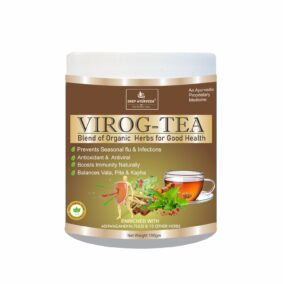 Virog Tea: Virog tea is a pure blend of Ayurvedic herbs enriched with healthy nutrients, vitamins, minerals, and other constituents. It is mainly made to boost immunity and prevent a person from seasonal ailments. It is made up of tulsi, ashwagandha, dalchini, talish patar, mulethi, and other herbs rich in antimicrobial, anti-inflammatory, anti-oxidants properties, normalizes the function of each organ.
Virog Tea: Virog tea is a pure blend of Ayurvedic herbs enriched with healthy nutrients, vitamins, minerals, and other constituents. It is mainly made to boost immunity and prevent a person from seasonal ailments. It is made up of tulsi, ashwagandha, dalchini, talish patar, mulethi, and other herbs rich in antimicrobial, anti-inflammatory, anti-oxidants properties, normalizes the function of each organ.
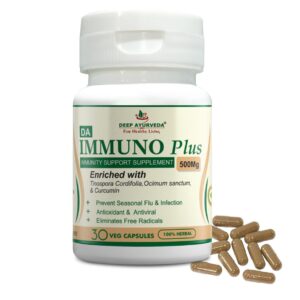 DA Immuno Plus Capsule: DA Immuno plus capsule acts as a strong natural immunity booster supplement having a high amount of anti-oxidants that helps to eliminates excess toxins from the whole body and protect the body against free radicals, neutralizes specific antigens, increases the stamina and ability to defend against flu and infections. Hence, it is made up of giloy, tulsi, curcumin, amla, mulethi, and other essential herbs that provide multiple health benefits to an individual.
DA Immuno Plus Capsule: DA Immuno plus capsule acts as a strong natural immunity booster supplement having a high amount of anti-oxidants that helps to eliminates excess toxins from the whole body and protect the body against free radicals, neutralizes specific antigens, increases the stamina and ability to defend against flu and infections. Hence, it is made up of giloy, tulsi, curcumin, amla, mulethi, and other essential herbs that provide multiple health benefits to an individual.
For more detail on Tulsi (Ocimum sanctum), please visit our nearest clinic or if you want to consult with our Chief Ayurveda Consultant & Founder – Dr.Baldeep Kour, then write with detail history at info@deepayurveda.com

